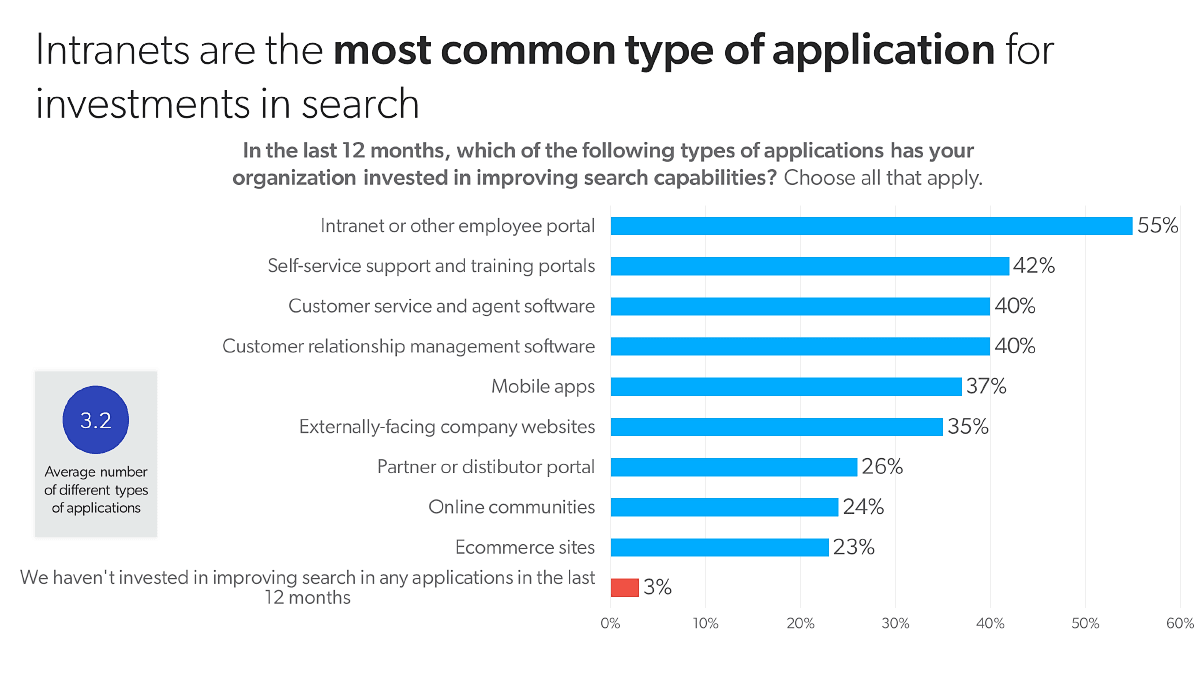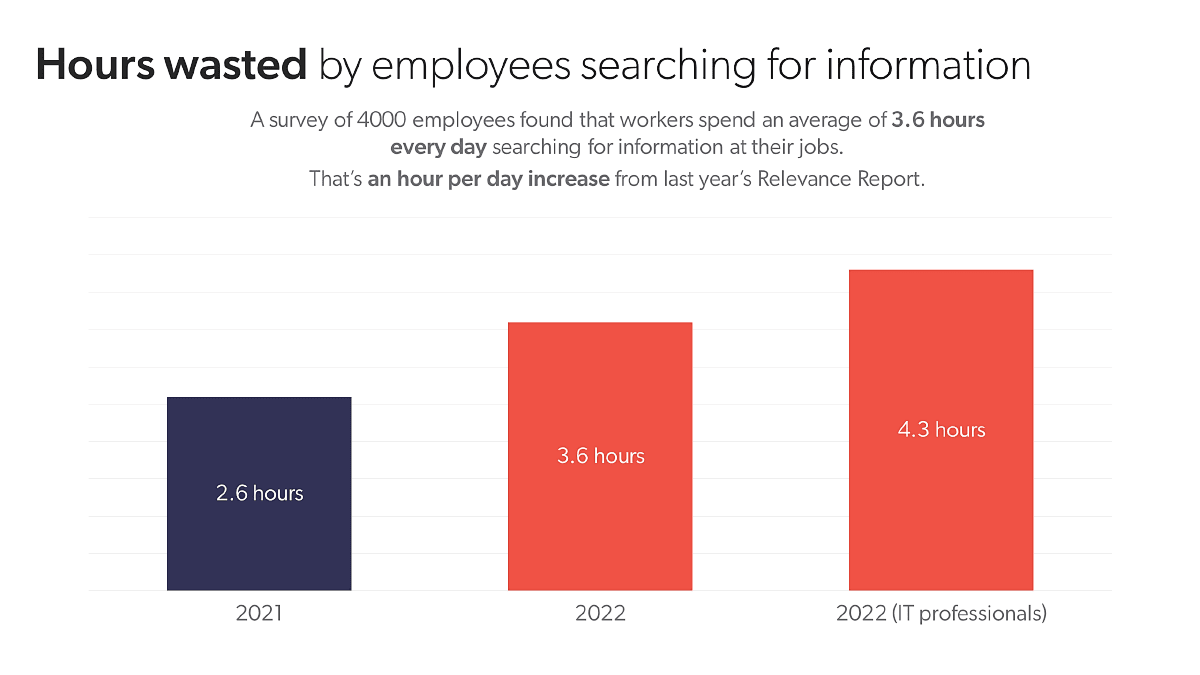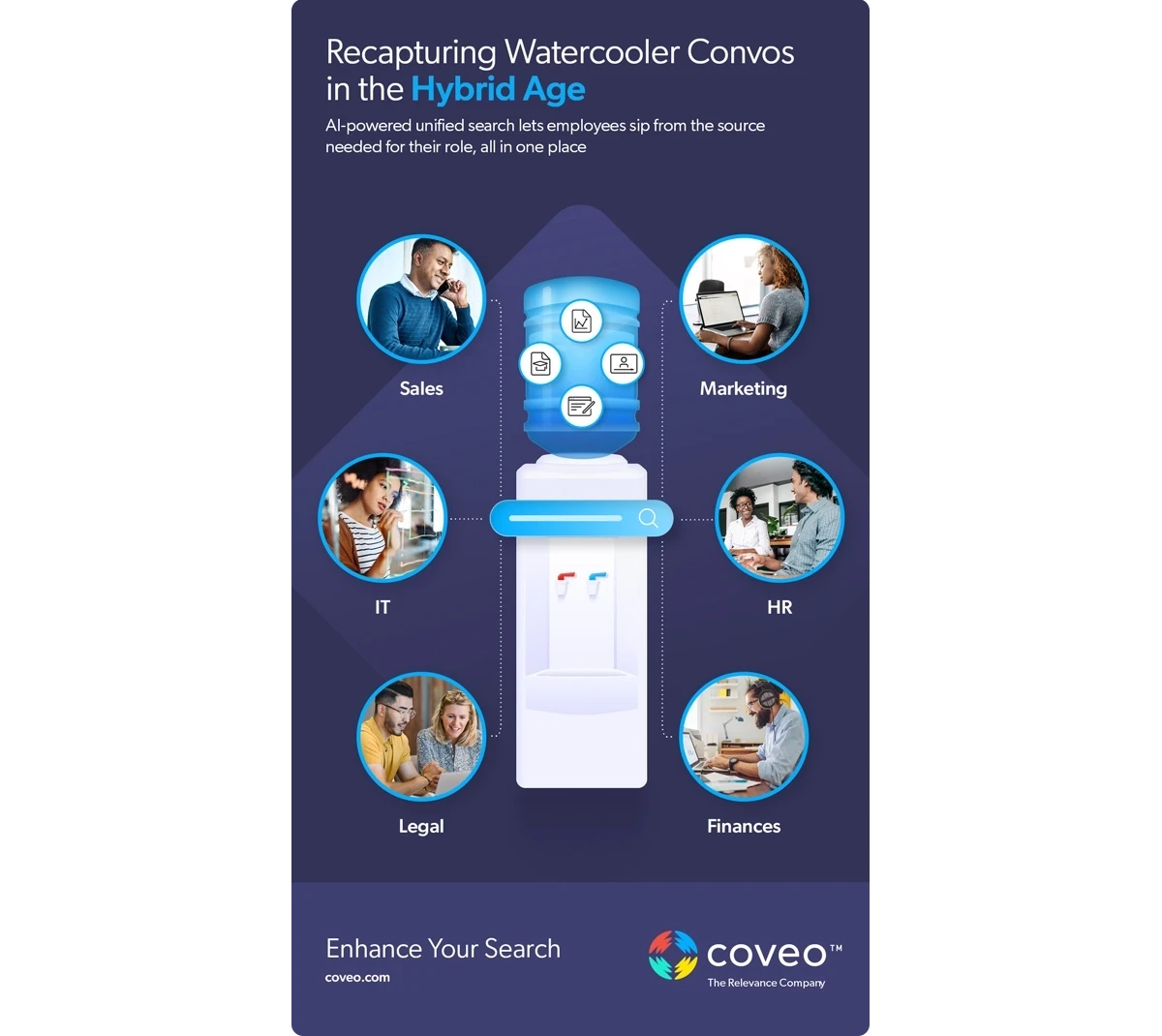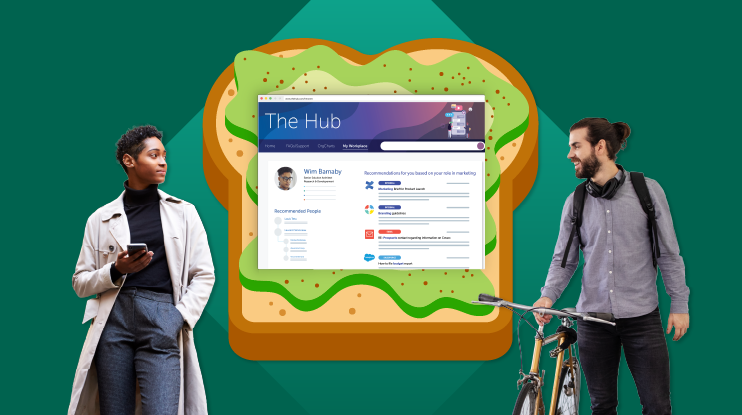Avocado toast not bringing all the millennials to your yard? Sorry, I just dated (and outed?) myself.
Anyway, between the pandemic and the Great Resignation, work is evolving, with millennials leading a change in attitudes. But why would appealing to them improve employee engagement? Well, they’re now the largest demographic in today’s workforce. And what do they want? According to Dell, millennials highly value an organization’s embrace of technology and innovation when choosing their next employer. (And Gen Z, an even more digitally native demographic, is right behind them — so this trend isn’t going away.)
To impress disillusioned millennials and entice their engagement, HR and digital workplace IT leaders should consider the intranet — more specifically, the search infrastructure behind your intranet. Need social pressure? Fifty-five percent of respondents to our 2021 state of enterprise search survey said that their focus for a search upgrade was their intranets. Clearly, something is lacking!

Upgrading the search technology in your intranet is a strategic solution, as such knowledge hubs have become crucial for internal communication between hybrid and remote employees across the globe. You can also reap tangible top and bottom-line rewards, because investing in intranet search is also an effective way to invest in your dedicated workers by educating and upskilling them.
But search alone won’t transform a disengaged employee into an engaged worker. AI-powered search can match indexed content with the intent of people searching. Let’s unpack how you can achieve a modern intranet that improves employee engagement and is the heart of your company’s digital workplace experience. Starting with …
Why is Millennial Employee Engagement Important?
Let’s take a short detour. Hear me out, I promise this will make sense in due course.
Teamwork makes the dream work, as the saying goes. But any great collaboration requires buy-in, or for this article’s purpose, engagement. Think about it — what does employee engagement look like in a tangible form? Employees who are present and productive, thus likely more attuned to the needs of customers.
Employees are interfacing with your buyers, learning their customer story, and using that information to find like minded individuals interested in your product or service — or even identify new markets. Improving the engagement level of your employees helps improve your product, your relationship with customers, and, in the long run, can have a direct impact on revenue and profitability.
According to Gallup, companies with highly engaged employees reported 20% higher sales. Happy, engaged employees are 12% more productive. And 89% of companies expect to compete primarily on customer experience in our new, always-on digital age.
And these are just a handful of stats that anyone can find via a quick search. Clearly, there’s a case to be made for improving employee engagement.
So, what contributes to employee engagement? Workplace culture, their manager, training, just to name a few things. To drive intrinsic motivation in employees, businesses should strive to meet employees where they are, just as they do for customers. And this is where updating your intranet search helps improve employee engagement. Ask yourself …
Why Do Employees Hate Your Intranet?
Understanding why intranet search has been … awful, is to recognize that traditionally, search was federated. Almost what you want — but not quite.
With traditional federated search, the employee submits a query onto a single search bar. The search engine then broadcasts the query to all the data sources. And then pulls all results from those sources into respective groupings. But the results aren’t ranked and unified into a single list. Instead, workers need to know which data source would have the most relevant information and look into each. It’s not exactly a recipe for employee satisfaction.
What employees are looking for is usually buried in unstructured or semi-structured content. And sifting through unstructured content is daunting. Think sentences: the type of content that doesn’t fit well in tables or rows. (Unless it’s like the comment section in a spreadsheet — but that’s never really searchable, right? Therein lies the problem.)
When employees need to open documents, read them, assess if they are the right ones — or if they need to move on to the next — it creates stress. Now compound this by the number of possible documents (and the number of questions an employee will ask themselves during said assessment) and no wonder they’re burnt out. Our own research has found that the average employee spends 3.6 hours every day searching for information at work. (Workers who identified as being in information technology said it was worse: 4.3 hours a day!)

And worse, in a global study of 4,000 workers, we found that 15% said the stress of being uncertain made them want to quit their jobs.
A unified search engine indexes all this unstructured content, and ranks them in a single list by relevance.
Further, machine learning can canvas usage data to better understand your employees’ context, intentions, and roles. This powers the engine to provide relevant content (and recommended content) automatically. AI-powered search makes content more accessible and can personalize the intranet experience for individual employees. This bridges gaps in knowledge management, which can lead to greater job satisfaction.
Accessing the most relevant content in a timely manner reduces the stressors on workers and improves employee engagement.
Why Does My Intranet Need AI?
One word: Personalization. Employees are people, too, and they use Netflix, Amazon, and Spotify (to drop just a few AI-powered, industry-disrupting names). This can lead them to wonder, why isn’t my digital workplace as fluid as these applications?
Well, how do you personalize the employee experience in an enterprise comprising many roles, departments, locations, and even languages? With artificial intelligence — more specifically, machine learning.

You can build this type of personalization into your intranet search engine from day one using Coveo. And to deliver a truly next-generation employee experience, you can proactively display personalized content across any device by deploying Coveo’s headless components.
Choosing which content to display on your intranet dashboard will depend on the unique attributes that apply to your employees. Think about the various ways in which your employees’ needs differ from each other, using attributes such as:
- Location
- Department
- Role
- Tenure
- Project
- Product line or market
Once you understand the types of personalized content that are most important to your employees, you can start to build an effective intranet dashboard that serves all of these in one spot.
Enabling access to information is just one of many best practices when it comes to improving employee engagement. Another that can help build an engaged workforce is supporting your employees through professional development — which can’t happen when they’re prevented from learning.
Invest in Professional Development By Sharing Accessible Resources
A 2021 Gartner poll found that 59% of HR leaders stated developing critical skills and competencies is their top priority in response to the Great Resignation and preventing employee turnover. Hybrid and remote workplaces create an additional obstacle to offering professional development resources that improve employee engagement — but this is also where an AI-powered intranet can help.
By making relevant information more accessible to employees via the intranet, it naturally upskills them — helping your professionals refine their talents. A 2021 study surveying 32,500 workers found that 77% of employees are eager to learn new skills. Companies need to capitalize on the opportunity to transform search as a learning vehicle for engaged employees to reduce the impact of expertise loss while nurturing engagement and retention metrics.
Additionally, search analytics can be used to build your workplace’s content strategy. They can identify queries that employees search for, but receive few results for. This indicates a content gap and opportunity for more intranet content creation, formal training, and knowledge sharing.
Investing in worker skills and employee communication is a great way to ensure employee retention. By combining your workplace’s intranet with communication platforms like Slack, workers save vital time they would have used searching for answers on their own. This leads to an overall increase in productivity and better company culture while making life easier for everyone in the process.
Intranets are also a connective tissue for collecting employee feedback. With an employee engagement survey, senior leaders can gauge employee perceptions about processes, policies, and the business as a whole — and make changes when and where necessary to build the workplace that employees want.
Like stated previously, it’s the same thing we do for our customers; responding to needs and problems in the marketplace. Why shouldn’t we do the same for our workers?
Implement Your Employee Engagement Strategy via Intranet Today
Optimized, modern intranets that support synchronous and asynchronous communication are the future of the digital workplace. And if you want one more factoid about the strength of an AI-powered intranet, let’s look back at Dell — who increased their ESAT score 37 points in just 12 months by adding Coveo.
Upgrading your intranet is just one of many ways you can build the digital workplace millennial employees expect. Learn more in our ebook, Guide to Delivering AI-Powered Employee Experiences.
Dig Deeper
Want to learn more about how AI-powered search can power your workplace? Check out our blog about the 6 Intranet Best Practices for a More Engaged Workplace in 2022! And learn what five experts did to make the intranet the superstar of their company in our post Ineffective Intranet? Apply Machine Learning.



